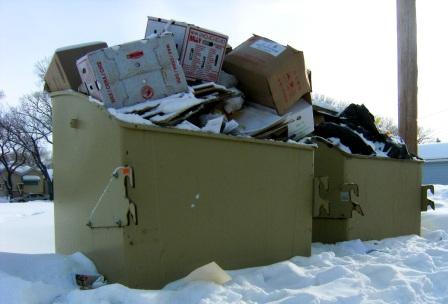by Melanie Taylor
Cody Hyam believes his basic right as a Regina resident is being taken away. Hyam may have to pay up to $150 per year to have garbage removed from his home if a proposed waste plan is approved by city council on Jan. 18.
“Waste removal is a basic right that a city must provide. To charge people for it, it seems a little immoral,” said Hyam.
Under the plan, residents would be charged a user fee for garbage collection, and tax dollars currently used for garbage collection would be used to fund a recycling program instead.
City council has already endorsed a curbside recycling program, but how to pay for the program remains up in the air. It’s estimated that recycling will cost between $6 million and $7 million, equivalent to the amount currently spent on garbage collection. The city will also need to spend $16 million from the landfill reserve for capital costs.
Fred Clipsham, Ward 3 city councillor, is in favour of user fees for environmental goods such as water, sewage and garbage.
“The way to get someone’s head around using less is to charge them for what they use,” he said.
Clipsham has concerns about the plan, though. He said that people who reduce, reuse and recycle should pay less.
“It has to be evident to the homeowner that there’s incentive for reducing the amount of garbage they create. This plan does not have that,” he said.
One way would be different prices for roll-out bins. If you feel you will throw out less garbage, you could pay for a smaller bin, he said.
Sharron Bryce, Ward 7 city councillor, isn’t in support of all parts of the plan, either.
“What’s coming forward on Tuesday, the council hasn’t had time to debate. It actually might not happen or something different might happen. Until council actually debates it, nothing’s a done deal,” she said.
A survey of 1,000 residents in 2008 found 84 per cent supported curbside recycling provided by the city. However, many are unwilling to pay extra for it. Krystin Robinson, an environmental engineering student, said she would opt out of the recycling plan if she could.
“I take all my (recycling) to the blue bins myself. Whenever I take my bottles, I take my other recycling,” she said.
Robinson has other concerns about the program. In her solid waste management class, Robinson learned that low-income households don’t recycle as much. They will be paying for a service they don’t use, according to Robinson.
Brady Burnett, community liaison for the Heritage Community Association, believes Heritage residents will use recycling.
“An element of the population (in Heritage) already does curbside recycling. More will be happy to see it,” he said.
“We have a lot of issue in the community with respect to garbage control. We are very happy to see some proactive action to address this situation,” he added.
Larissa Shasko, leader of the Saskatchewan Green Party, approves of curbside recycling. It could potentially divert 40 per cent of waste away from the landfill, compared to 16 per cent today. Shasko thinks the next step is to make recycling mandatory for businesses and industries.
“According to my research, the industrial community is responsible for creating 80 to 90 per cent of garbage,” she said.
By the end of 2013, the city hopes to have all single-family homes using recycling roll-out bins.
Photo by Melanie Taylor


